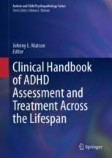Search
Search Results
-
Depression
This chapter begins with several studies about the rates of depression among members of the autistic population. Perspectives from clinicians and...
-
Beliefs About Depression
This chapter looks at common beliefs about depression and its relationship to other aspects of mental health. It describes different research...
-
Depression in Advanced Lung Cancer
Globally, lung cancer is one of the leading causes of cancer-related mortality both in men and women, having poor prognosis. This chapter examines...
-
Extracellular Vesicles in Depression
Depression, which is a prevalent mental disorder, continues to have unclear pathophysiological mechanisms, making it difficult to discover biomarkers...
-
Depression and Peripheral Artery Disease
Peripheral artery disease (PAD) is a chronic disorder that results from atherosclerosis of the major arteries, commonly in the legs. As blood flow to...
-
Digital Addiction, Depression, and Suicide
This chapter explores the complex interplay between digital addiction, depression, and suicide, emphasizing their significant impact on mental...
-
Depression in Kidney Failure Patients
Major depressive disorder (MDD) is a widespread mental health disorder that has significant worldwide consequences, as it is the second most...
-
Alcohol, Depression, and Anxiety
Alcohol consumption, depression, and anxiety are conditions that have significant implications for individual well-being and public health both...
-
Depression Assessment
This chapter provides an overview of the assessment of depression in children and adolescents. First, we briefly review prevalence rates and discuss...
-
Screening for Depression and Anxiety
Depression and anxiety are common mood disorders that can cause significant distress or impairment to social, occupational/academic, or other primary...
-
Which types of family caregivers are more prone to developing depression? Leveraging non-financial social support to mitigate depression
Family caregivers face stress, especially those facing financial burdens. Therefore, it is crucial to evaluate non-financial social support...

-
Depression
Depressionen stellen eine sehr heterogene Gruppe an Erkrankungen dar. Der große Überbegriff, unter den die Depressionen fallen, ist „affektive...
-

-
Depression
Depressions represent a very heterogeneous group of diseases. The broad term under which depressions fall is “affective disorders”.
-
Social expectations in depression
Individuals with depression often exhibit distortions in interpersonal perception and behaviour that are tied to negative expectations about social...

-
Studying Biomarkers to Assess Perinatal Depression
Perinatal depression and anxiety impact maternal health and child development. As often overlooked conditions, they provide a valuable opportunity...
-
ADHD and Depression
Attention-deficit/hyperactivity disorder (ADHD) is associated with a higher risk of numerous comorbid disorders, including depression. Specifically,...
-
Delivering CPT in the Context of Depression
One of the most common comorbid mental health conditions associated with post-traumatic stress disorder (PTSD) is a depressive disorder. In many...
-
Depression: The Vagus Nerve and Gut-Brain Axis
Brain-body communication is pivotal in depression, encompassing intricate interactions among the nervous system, endocrine system, and immune system....
-
Perinatal Depression: Etiology, Risk Factors, and Biomarkers
Perinatal depression affects millions of people worldwide and is a contributing factor to sex-related health disparities. While the etiology has been...
